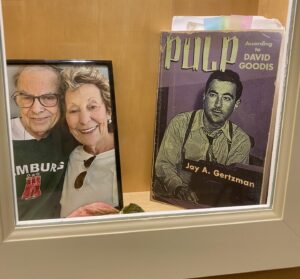A Man of Letters: Hearth Resident Jay Gertzman, Ph.D., Reflects on Teaching, Writing, and Censorship
August 20, 2025
Jay Gertzman’s apartment at The Hearth of Drexel is his literary sanctuary. Posters from his book signings line the walls, papers are scattered across his worktable, and a stack of books rests at his feet beside a recliner. His living space reflects the life of a man of letters—an educator, author, and champion of free speech. “The communication between an individual reader and a book is one of the best ways to think about and understand oneself,” Jay says.
When Jay was a young high school teacher in 1960, the Philadelphia bookstore owned by his father and uncle was raided by five detectives and an Assistant District Attorney. They seized 500 books they claimed were illicit, and the raid made the local news. The books in question featured covers of women in low-cut gowns, tame by today’s standards.
“I was in the early years of teaching, so naturally I was concerned,” Jay says. “It was my Dad who suffered, but indirectly my reputation was on the line. This was an introduction for me to censorship and the embarrassment it can cause. That’s one of the things that made me very interested in censorship, how selective it was.”
This pivotal moment ignited his lifelong fascination with the power of words, the politics of literature, and the voices society tries to silence. Jay would go on to earn his doctorate in English and Comparative Literature and teach at Mansfield State College, where he was Professor of English for thirty years, and author six deeply researched books that examine a wide range of topics—from the life of a notorious publisher to the emergence of the literary genre called country noir.
A running theme of his work is the tension between shame and curiosity, the importance of freedom of expression, and the works of authors who faced censorship.
“It’s very interesting to see how people can’t avoid both shame and curiosity at the same time, and they get mixed together into something puritanical,” he says.
During his time at Mansfield, Jay taught thousands of students in freshman and advanced composition. “They needed most of all not to talk or read about literature, but to learn how to write sentences correctly. We had to teach them to write and understand who they were writing for.” One of his greatest pleasures, though, was teaching Shakespeare to his mostly rural students. “The students had respect for that,” he says. “And several parents were proud of the fact that their sons and daughters were reading Shakespeare, because that to them meant high culture.”
Jay’s literary interests are as diverse as his writings, and his apartment reflects what he treasures most: books on a wide range of subjects, notes on his most recent literary explorations, and copies of his own works, including Samuel Roth, Infamous Modernist; Bookleggers and Smuthounds; Beyond Twisted Sorrow: The Promise of Country Noir; A Descriptive Bibliography of Lady Chatterley’s Lover; and Fantasy, Fashion, and Affection: Editions of Robert Herrick’s Poetry for the Common Reader, 1810-1968.
 He considers his 2018 work Pulp According to David Goodis his favorite, and has it proudly displayed in the window box outside his apartment next to a picture of his beloved sister, Adele. “She’s everything to me,” he says with a smile. “She makes sure I’m taken care of. She’s just a wonderful person.”
He considers his 2018 work Pulp According to David Goodis his favorite, and has it proudly displayed in the window box outside his apartment next to a picture of his beloved sister, Adele. “She’s everything to me,” he says with a smile. “She makes sure I’m taken care of. She’s just a wonderful person.”
The compassionate care and peace of mind Jay enjoys at The Hearth allows him to continue exploring the world of ideas and themes that have always fascinated him—freedom of expression, literary history, and the enduring power of words.



